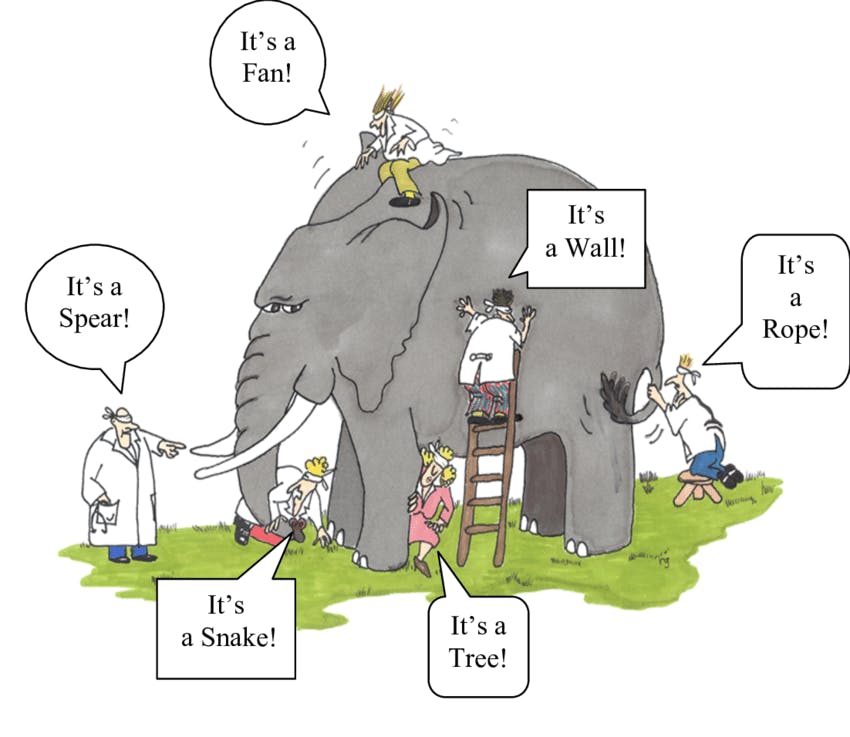Getting Started In Tech. What You Need to Know
Actionable points to help you get started on the right career path in tech for you.
So tell me, did a friend or someone you know talk about tech or did someone on Twitter recently announce a mouth-watering job offer from a tech company? Or you are jaded with your current job and are looking to make the transition to tech?
And you’re wondering (rightly so), how to get in on the act? You're asking yourself, "how can I position myself to take advantage of this ‘tech’ thing? How can I get my own share of the insane dollars flying around in tech? How do I start my tech career?"
If these are some of the questions you have been asking, then no worries my friend, because I have some answers for you. The one thing I ask of you is that you stay open-minded and inquisitive while reading this article.
Ready to dive in?
Let’s start with what tech is. Really, what is tech?
What tech is
First off, the word tech is a less mouthful, mono-syllabic abbreviation for the word technology.
See? Easy peasy, can we all go home now? Well, not yet, because we haven’t talked about what technology is.
A quick Google search will show you tons of definitions of what technology is and here is one:
Technology is simply science or knowledge put into practical use to solve problems or invent useful tools.
Wikipedia has a more interesting definition:
Technology is the sum of any techniques, skills, methods, and processes used in the production of goods or services or in the accomplishment of objectives.
Keep these definitions in mind because I will make a reference to them later on in this article.
What tech isn’t
I just shared a simple but effective explanation of what technology is and you might be wondering, “why do I need to know what technology is not since I already know what it is?”.
I like that you are asking that - we promised to stay inquisitive and you are coming through! So, I’ll tell you why with a short story.
Several blind men encountered an elephant. The blind man who touched the trunk, said it felt like a snake. The blind man who touched one of the legs of the elephant said it was a tree. Are you already getting the picture?

So if you happened to meet the blind man who touched the legs of the elephant and asked him what the elephant was, he would describe it as a tree. Similarly the one who touched the trunk, would describe the elephant as a snake, a big snake.
Why am I saying all this?
It is in our human nature to overemphasize certain parts of a thing that we have experienced oftentimes at the expense of the other parts, that we haven’t experienced or do not know about.
A popular misconception flying around these days is that tech is coding. Did I hear you ask, what is coding? Thanks again for staying inquisitive.
Coding is essentially a conversation between a programmer (often a human being) and a computer asking the computer to carry out some certain tasks.
If you need someone to help you with a task, you would tell the person the details of the task and ask the person in a language the person understands. Coding is really no different from that.
Now we know what coding is about, here is what I want to say:
Coding is Tech but Tech Isn’t Only Coding
Read that again and understand it very well.
While coding is essentially the part where the computer is instructed to do certain things, tech is so much more than just coding. It is the sum of any techniques, skills, methods, and processes (remember the definition from Wikipedia) to produce a good or a service.
Essentially, tech is:
- Techniques
- Skills (coding being just one of them, but there are others)
- Methods
- Processes
So when you say you want to get started in tech, it doesn’t always mean that you have to learn coding (I’ll be happy if you decide to because I’m a coder myself).
You can find your path by gaining mastery and knowledge of any of the other techniques, skills, methods and processes required in tech.
So how do I find my path?
I know you have questions but first, let’s take a moment to acknowledge that you have already made some progress just by reading this article and your journey into tech has started.
Now you know what tech is and what it isn’t, a recommended next step would be knowing what paths to follow in tech because like I mentioned earlier, tech is vast and I believe everyone who’s genuinely interested can find their place in it.
It’s okay to roll your eyes at me because I’m about to go all motivational on you. 😄
I recently co-hosted a Twitter Space (remove link because no recording) where I talked about the different non-coding career paths for people looking to get started in tech. In that talk, I shared some tips, which I’ll share now, that can help you determine what career path you should follow.
One thing to note here is that these are not absolutes, they are guides. So here are the tips:
Choose a path that aligns with your core strengths: If you find yourself drawn to abstract concepts, there's a chance you might be excel better in coding and other related career paths. If you have a thing for art and design, maybe being a User Interface/User Experience designer might be a good fit.
Choose a path that you are passionate about and very interested in: If you are looking to build a career that will last, it is germane you choose a path that you are interested in, because that will help keep you going when the hurdles come because they will. And I just want to add that if all you’re interested in is the money, that’s okay too so long as you find fulfillment in that.
Choose a path that leverages your previous experience: This might be more helpful for people looking to make a transition from a non-tech career into tech. Again these aren’t absolutes, but I’ve seen them work for other people and it just makes the transition easier.
With that said, let me now share some different career paths in tech.
Career Paths in Tech
This is by no means an exhaustive list of career paths in tech but I believe it is decent enough to serve as a guide to helping you make a decision.
I would have loved to talk a bit more about each of these paths but that would make this article too long; so instead I added links to each of the paths listed here so you can read more about them if you are interested - remember we said interest is key to helping you find your path.
Coding-Related Paths
Here are paths in tech that will have you holding conversations with a computer:
Back-end Development: It involves building the behind-the-scenes services that power web/mobile applications.
Blockchain: is a shared, immutable ledger that facilitates the process of recording transactions and tracking assets in a business network.
Cybersecurity: It describes the practice of protecting computers and critical systems from malicious attacks.
Data Engineering: This focuses on using scientific methods and systems to extract insights from data.
Data Science: This entails building the pipelines and systems for the storage and passage of data at scale.
DevOps Engineering / Cloud Engineering / Infrastructure Engineering: Sometimes used interchangeably, this career path focuses on building and maintaining the pipelines and infrastructure used by applications.
Game Development: This focuses on development of design and development of games across different platforms.
Machine Learning / Artificial Intelligence: Machine learning (often viewed as a subset of artificial intelligence), but they both focus on creating intelligent systems that keep learning.
Mobile Development: As a mobile developer, you will be tasked with development of applications for mobile devices
Network Engineering: Network engineers design, build and maintain computer networks for organizations.
Software Testing (Automated): It involves using software tools to automate a manual process of software testing.
Web Development (Front-end): This involves developing applications to be viewed via a web browser with a focus on building the user interface of the web application.
Web Development (Full-stack): This combines both front-end and back-end development defined above.
Web3 Development: The hottest kid on the block, this focuses on building decentralized applications that run on either blockchain or other decentralized networks.
Non-Coding Paths
Also, here are paths in tech that won't require you having conversations directly with a computer:
Data Analysis (some cases): This involves collecting, cleaning and interpretation of data to draw insights. This is often the entry path for people looking to go into data science.
Data Privacy Management: This focuses on helping organizations maintain compliance with data privacy laws and regulations.
Developer Advocacy/Developer Relations (some cases): This role focuses on building excellent relationships with developers, who mostly use a company’s products or services.
Digital Marketing: Sometimes referred to as online marketing, it entails the promotion of goods and services using the internet and other forms of digital channels. Think of it as marketing powered by tech.
Product Management: This career path focuses on planning, creating, managing and launching products and services within an organization.
Project Management: It describes the use of specific knowledge, skills, tools and techniques to ensure delivery of something of value to people.
Search Engine Optimization / Search Engine Marketing: Often used together, they both describe a form of internet marketing that involves the promotion of websites by increasing their visibility in search engines.
Software Testing (Manual): In contrast with automated testing, this describes a manual process of testing software without the use of automated tools.
Tech Community Management: This career path focuses on building, managing and growing tech communities.
Tech Law / Intellectual Property Law: The body of law that governs the use of technology, with IP law being one of the hottest paths. So you can think of this as law but with focus on tech.
Tech Recruiting: This comprises sourcing, screening, and assessing candidates who fit specific technical roles
Technical Writing: Technical writers are professional communicators who seek to transfer technical knowledge to their audience through writing.
User Experience Design: This focuses on creating products that provide meaningful and relevant experiences to users.
User Experience Research: A UX researcher studies would-be users of a product, to understand their requirements and add these insights into the design of the product.
User Interface Design: While a UX designer focuses on experience, a UI designer designs interfaces for applications with focus on look and style.
I tried to not overload you with a lot of information, believe me I did. One thing you should see however, is that there are a good number of career paths that don't require coding, if you believe coding is not your thing (I'll be curious to know why though).
Next Steps
By reading to this point, I assume that you have found a path you want to follow. Now it's time to take concrete steps to follow that path.
Here are some recommended next steps:
Research more on your chosen path
I highly recommend that you do some good research about the path you have chosen. Researching more about your chosen path will give you a better understanding of what the path entails but more importantly, it will paint to you a clear picture of the gulf between where you are and where you want to be - that should be the goal.
Like I mentioned earlier, I have added links to the different career paths. These links are a good first place to begin your research, but you should go beyond just reading the articles I've shared. I highly recommend speaking to someone who's an expert in your chosen field. If this is something you are interested in, you can complete this form where we will try to match you with someone who is an expert in your field of interest.
Develop a learning plan
So you have researched your chosen tech career path, you are very excited and you can't wait to get started. I'm not here to dampen that excitement because I'm also excited for you, but I want to highlight the importance of developing a learning plan.
A learning plan essentially is your system for getting you from where you are to where you want to be (which ties into the output of the research step).
Another thing a learning plan will help you do is to keep you going on those days when the excitement seems to have faded because there's a high chance that those days will come.
For easy reference, here's a sample of what my learning plan looked like at the time I wanted to learn about a certain technology - Docker:
- Read a new article on Docker every week (LEARN)
- Spend 1 hour every day writing Docker commands (DO)
- Talk to someone who is a Cloud/Infrastructure Engineer (CONNECT)
The last thing I want to mention here is that your learning plan is a living document, so you should keep updating it as you get more information.
Just start
As Nike says, "just do it".
Once you've developed a learning plan, just start. Starting might mean enrolling in a course or joining a community of other learners but hey, just start.
And don't worry if you feel dumb at the onset, all masters were once dumb when they started and here's a quote I find very interesting:
"Embarrassment is the cost of entry. If you aren't willing to look like a foolish beginner, you'll never become a graceful master".
Need I say more?
Set measurable goals to track your progress
Yes, you're going to learn but you also need to set goals (think of them as milestones) to track your progress.
I recommend breaking down your goals into items so that you can act on them every day, rather than waiting till the end of the month or year to achieve your goal.
Here are some examples of measurable goals:
- Complete a course module every day.
- Publish an article about what you have learned every week.
- Contribute to an open-source project every month.
Get an accountability partner
Life is better done with another person so on this journey, I'll recommend finding someone to keep you accountable. This can be a friend, a mentor - preferably a buddy, or even a community.
Whatever you choose should be based on your preferences and what works best for you. Don't be caught doing something because everyone else is doing it, it should work for you.
If after reading through this article, you are still unsure of what path you want to follow - that's absolutely fine. I'm happy to schedule a one-on-one chat with you, you can use this link or send me a DM on Twitter.
Some final words
As we conclude, let me share a personal story.
I went scuba-diving for the first time last year and one of the things I was told in preparation for that adventure was that scuba-diving was a lot easier if one knew how to swim. But more importantly, to enjoy scuba-diving, I had to wear the right kit to enable me to breathe more easily so I could navigate the beautiful ocean depths.

With the loads of information out there about tech, I hope with this article, I have given you all the courage, motivation and most importantly, the right knowledge (kit) you need before you go scuba-diving into the vastness that tech is.
I'm super excited that you have considered getting into tech because there are a ton of problems that we can solve in our world today. I could go on and on writing this article but I would rather pause here and have you channel your energy into taking the next steps as soon as possible.
So here's me, your number one fan rooting for you. I wish you all the best in your career.
You've got this!
In my next article, I'll be recommending some free resources - courses, articles and more, to help you get started in selected tech career paths. Please let me know which ones you are interested in the comment section so I can include them in the article.

